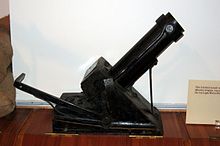Herbert Garland
Major Herbert Garland OBE, MC, FCS, M. Inst. Metals. was a British metallurgist and army officer. An Army Ordnance Corps member, in 1906 he was stationed on Guernsey, where he wrote a novel, Diverse Affections a Romance of Guernsey. Garland rose to become Superintendent of Laboratories at the Cairo Citadel, Egypt by 1913 and received a grant from the Chemical Society, of which he was a fellow, to conduct research into ancient Egyptian alloys. The outbreak of war saw him commissioned as a Special List officer with the Arab Bureau. Garland developed explosives for the army, including the Garland grenade and was, in September 1916, assigned to train T. E. Lawrence and the fighters of the Arab Revolt in explosives. His mines were used against the Hejaz Railway and may have been involved in the first derailing of a moving train by explosives. Garland commanded the desperate defence of Yanbu in which he forced an attacking superior Ottoman force to withdraw with almost no bloodshed. Awarded
Garland was born in Sheffield in 1880. In 1906, he published a novel, Diverse Affections a Romance of Guernsey, written whilst stationed on the island with the Army Ordnance Corps. Garland was later transferred to Khartoum, Sudan and by the outbreak of the First World War was Superintendent of Laboratories at the Cairo Citadel, Egypt, where he had received a grant from the Chemical Society to research ancient Egyptian alloys. He was elected a fellow of the society the same year. He was one of the first to study the crystalline structures of metals by polishing, etching and examination by microscope. He had three papers published in the Cairo Scientific Journal in 19134 entitled Ancient Egyptian Metal Tools, Outlines of Metallography and Some Physical Properties of Tin.
Source: Wikipedia

